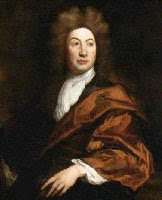 Whilst there had been various unofficial royal poets previously, the first person to be officially recognised as Poet Laureate by letters patent was John Dryden who received the honour from King Charles II on 13th April, 1668. Born into the Puritan landowning gentry in August 1631, Dryden grew up in Northamptonshire before attending Westminster School, as a King’s Scholar. After graduating from Trinity College, Cambridge, Dryden relocated to London where he found a position with the Protectorate Government.
Whilst there had been various unofficial royal poets previously, the first person to be officially recognised as Poet Laureate by letters patent was John Dryden who received the honour from King Charles II on 13th April, 1668. Born into the Puritan landowning gentry in August 1631, Dryden grew up in Northamptonshire before attending Westminster School, as a King’s Scholar. After graduating from Trinity College, Cambridge, Dryden relocated to London where he found a position with the Protectorate Government.
In 1658, he published his first major work, Heroique Stanzas. Two years later he produced an enthusiastic panegyric poem, Astraea Redux, in celebration of the Restoration of the monarchy. Over the following decade Dryden’s fame as a poet and literary critic grew resulting in his laureateship. Charles also conferred upon him the title of historiographer royal in August 1670.
Following the ascension to the throne of King James II, an avowed Catholic, in February 1685, Dryden converted to the same faith. Apparently, this was not to curry favour with the new monarch who had rapidly promoted many Catholics to high public office. Dryden was a critic of this policy, which – in his view – was counter-productive. Indeed, in 1688, a number of powerful political magnates approached William of Orange and his Stuart wife, Mary, with the offer of the Crown in order to protect Protestantism in Britain.
James went into exile, and Dryden lost his position as poet laureate to his rival, Thomas Shadwell, because he would not swear allegiance to the new monarchs. He continued to write until his death from gangrene in 1700. He was initially buried in a parish church before being interred in Poet’s Corner in Westminster Abbey.
You can find out more about Dryden and his works on his page at the Bartlebyweb site. Project Gutenberg also hosts a number of Dryden’s works.

